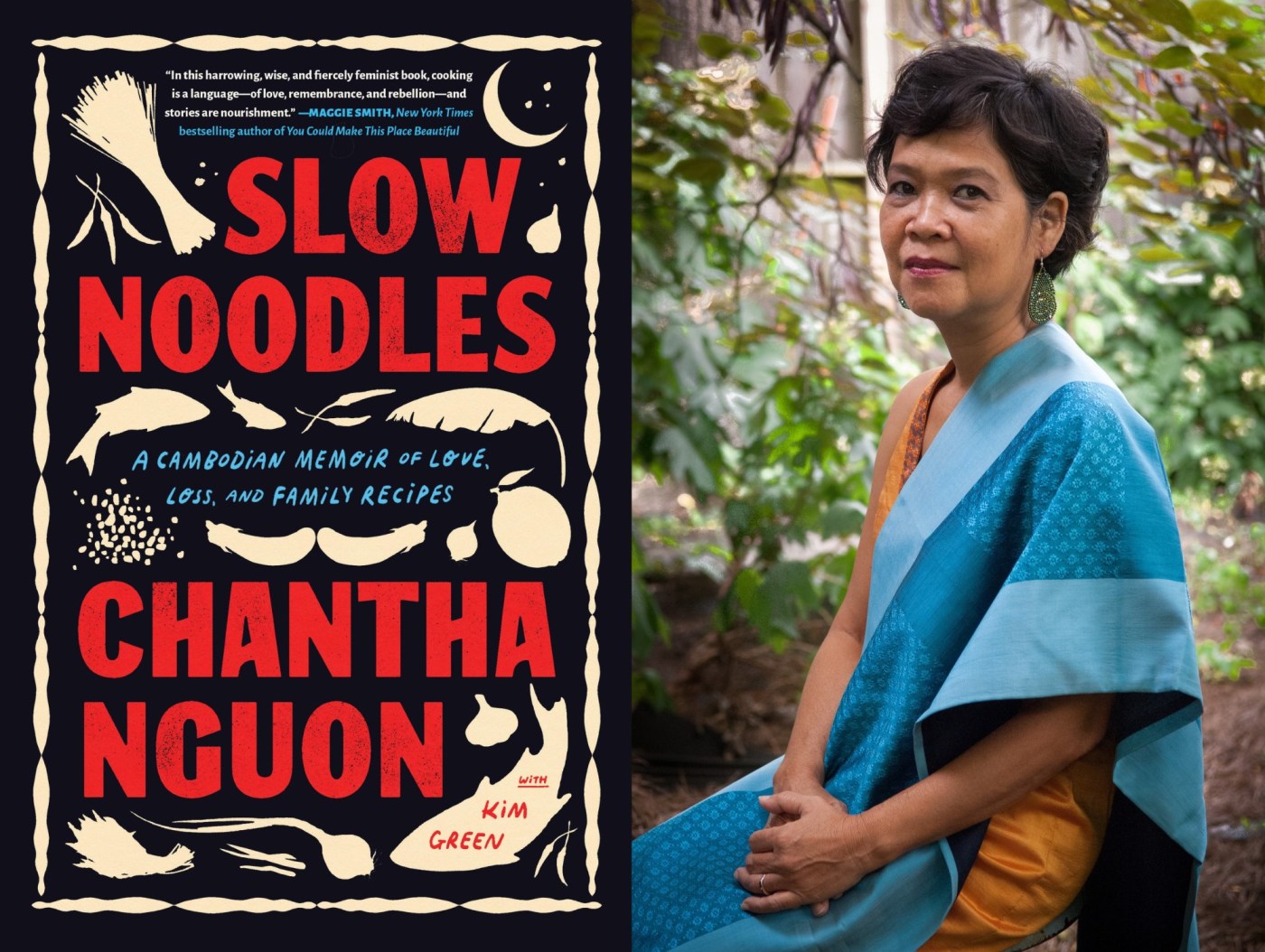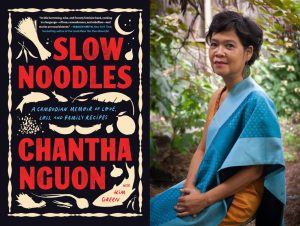
How ‘Slow Noodles’ helped a mother tell of escaping the Cambodian genocide
When her children were younger, Chantha Nguon would often share stories from her life during meals. But they weren’t always the easiest memories to recount.
As a child, Nguon had been uprooted from her home in Cambodia. Though she made it out of the country and into Vietnam to escape the genocide being inflicted by the Khmer Rouge, more hardships followed.
In her memoir “Slow Noodles,” co-written with Kim Green, Nguon recounts not only these struggles but also her efforts to help those who currently face poverty and hunger the cofounder of Mekong Blue and Stung Treng Women’s Development Center in Cambodia.
She shares her experiences, in part, through a collection of recipes.
“In Cambodia, we have a saying, we don’t lift our shirt to show our skin,” Nguon says on a recent video call from Phnom Penh. Despite her reticence, Nguon knew that she needed to tell her story to her children. “Maybe the children – my children’s generation – they don’t know what happened to their parents, but I want my children to appreciate what they have today,” she says.
Moreover, Nguon’s personal memories are part of the greater, collective history of the terror inflicted by the dictator Pol Pot and the Khmer Rouge in the 1970s.
“That’s a very important part of the book – to tell the world about how to lose your home and become a refugee, to show the world that the Khmer Rouge, Pol Pot, tried to erase our culture,” says Nguon. “But I am the living proof that we don’t accept that and we have to survive and we have to rebuild our country.”
“Slow Noodles” refers in part to the approach to cooking that Nguon’s own mother undertook. “She despised shortcut cooking,” Nguon recalls. “Slow noodles is her dish. She made a noodle by hand, by a small piece of dough and she rolled it into a noodle one by one.”
Similarly, she says, slow noodles is a way of life. “You need extra patience, and especially hope,” says Nguon. It’s a practice she adopted after her return to Cambodia in the early 1990s, where she began working with women impacted by poverty and hunger.
“I looked around and I saw, especially women, they are so vulnerable. They are so poor and they don’t know what to do,” she says. After years of working with Doctors Without Borders, Nguon started her own organization. “We need time to rebuild our life after loss with whatever tools we have, but slow noodles is to go opposite of instant noodles,” she says. “You need time and you need patience and you need hope and you have to do it yourself.”
For Nguon, food and memory go together. “Food is the best of what I remember about my mother and my sister,” says Nguon. “The memory of my mother and my sister and the love of their cooking, it helped me to survive through the harshness, the hardship.”
She adds, “Memory about food is memory about family. It comes together.”
While writing “Slow Noodles,” Nguon and Green would focus on the story in the morning; then in the afternoon, they’d cook. “I realized that to say it out loud is therapy, because it became my belief that everything good will be taken away from me,” says Nguon, adding that, when she had children, she had prepared herself to be separated from them. “After I worked with Kim, it helped me slowly let it go.”
Nguon’s daughter, Clara Kim, is the audiobook narrator of “Slow Noodles.” Kim, who is based in London, says that she volunteered for the gig, despite never having recorded an audiobook before because it’s her mother’s story.
“It’s interesting because I heard a lot of the stories that are not even included in the book since I was very young, but it was never in order,” she says on a recent video call. “To be honest with you, some of the stories are incredibly sad. For example, if we were sitting down at a meal, it could be a really funny, happy story or it could be incredibly difficult. I never really knew which one to expect.”
Reading “Slow Noodles” gave Kim a chronological sense of the stories that she had heard earlier in life. She also learned new details. “The scene where she’s describing her mother’s death. I had never heard that before,” she says. “I can understand why. It’s incredibly difficult for her to talk about that.”
Related Articles
Who is Jeremiah Brent? Meet the new ‘Queer Eye’ design expert following Bobby Berk’s exit
Wolfgang Van Halen says he’s surprised by quick success
What to watch: ‘Shogun’ a worthy remake of classic series
Pop culture-inspired travel is a serious trend in 2024
‘Mea Culpa’ review: In Tyler Perry’s Chicago, attorney-client privileges include sex and painting lessons
The book also gave Kim a sense of her father’s life. “Unlike my mom who talked a lot about her past, my father did not,” she says. “I learned everything about his past through the book, which gave me a newfound respect for him and also to understand all the things that he’s gone through as well.”
Kim hopes that “Slow Noodles” will resonate with younger readers whose parents may have gone through similar situations. “It doesn’t have to be Vietnamese refugees or Cambodian refugees,” she says, adding that wars and refugee crises persist throughout the world today.
She also hopes that the book will give people a better understanding of Cambodian culture and food, while noting that people often immediately associate the country with the Khmer Rouge. “I don’t want that to be our legacy,” she says. “I want people to know that our food is delicious. I want them to try to look for Cambodian food. I want Cambodian food to be as popular as Thai food.”
As for Nguon, the book also offers an example for navigating through difficulty.
“I hope the reader will see that it’s a recipe to find strength and also, with my own example, losing everything is not the end of your life. It’s not the end of the story,” she says. “You can always get it back slowly, like the way my mother made the slow noodles.”


